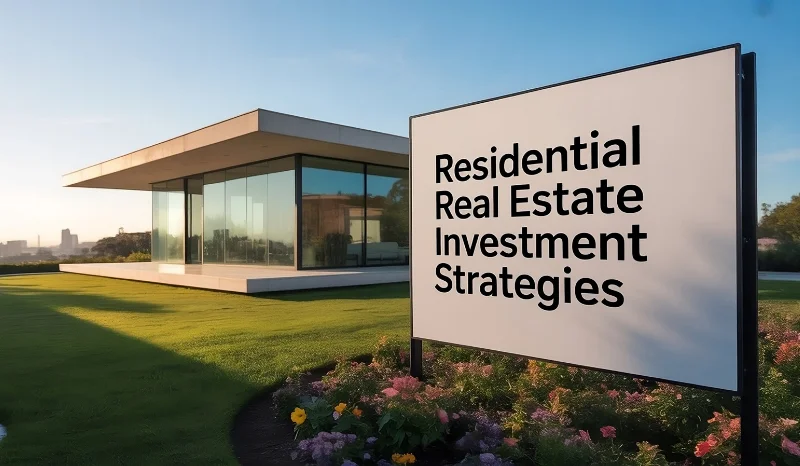When debating Commercial vs. Residential Investment, you’re choosing between two distinct avenues in real estate investment. Both approaches can generate strong return on investment (ROI), yet they differ in risk, cash flow, and management style. Consequently, understanding commercial investment and residential investment nuances will empower you to make informed decisions.
Moreover, factors such as housing demand, rental income, and maintenance costs vary greatly between commercial property and residential property. Therefore, this guide explores eight key dimensions, types, purpose, cost, regulations, stability, demand, returns, and upkeep, to help you determine which path best suits your objectives.
Types of Properties
First, consider the types of properties available in each category:
- Commercial Property :
- Office space and office buildings
- Retail shops and malls
- Industrial warehouses
- Hospitality venues (hotels, banquet halls)
- Residential Property:
- Single-family homes and plots
- Multi-family apartments and condos
- High-rise residential towers
- Vacation rentals and short-term leasing
Furthermore, buying commercial property often requires larger capital outlays, whereas residential investment can begin with smaller budgets.
Purpose and Usage
The intended purpose shapes investment strategy:
- Self-Accommodation vs. Income Rental:
- Residential properties cater to personal living needs or rental income streams.
- Commercial premises serve business needs, offering long-term leases and predictable cash flow.
- Long-Term Lease Agreements:
- Commercial tenants often sign multi-year contracts, ensuring stability.
- Residential leases typically renew annually, requiring more frequent tenant turnover.
Consequently, align property use with your financial goals.
Cost and Financing
Investment cost and funding options vary:
- Purchase Price:
- Commercial investment generally demands higher entry costs due to prime locations and larger floor plates.
- Residential investment offers a broader range of price points.
- Financing:
- Mortgages for residential homes carry lower interest rates.
- Commercial loans may require larger down payments and stricter credit evaluations.
- Maintenance Costs:
- Commercial properties incur higher upkeep for elevators, HVAC, and common areas.
- Residential units have lower overhead but multiply expenses across units.
Regulations and Bylaws
Navigating zoning/bylaws/regulations:
- Commercial property zoning demands permits for signage, parking, and business operations.
- Residential property rules focus on occupancy limits, building codes, and Lahore Development Authority ( LDA ), Capital Development Authority ( CDA), or any other governing body’s guidelines.
Moreover, commercial developments must comply with accessibility and fire safety statutes, whereas residential projects enjoy fewer regulatory hurdles.
Market Stability and Demand
Assess market stability:
- During an economic crisis/financial crisis, residential housing remains essential, sustaining housing demand.
- Commercial investment can fluctuate with business cycles; economic downturns may reduce office and retail space needs.
Similarly, a diversified real estate market portfolio can buffer sector-specific volatility.
Returns and ROI
Compare return on investment (ROI) :
- Commercial vs. Residential Investment ROI:
- Commercial properties often yield higher ROI (8–12%) through premium rents.
- Residential assets typically deliver 5–8% ROI, with steady occupancy.
- Rental Income:
- Commercial leases generate higher per-square-foot income.
- Residential rentals benefit from abundant tenant pools.
Ultimately, weigh return on investment against risk tolerance.
Maintenance and Management
Management responsibilities differ:
- Commercial investment allows the pass-through of many maintenance costs to tenants, reducing the landlord’s burden.
- In residential investment, landlords often cover repairs and handle tenant issues directly.
Furthermore, consider hiring professional managers to streamline operations.
Which Strategy Aligns with Your Goals?
To decide between commercial investment and residential investment:
- Choose commercial if you seek higher yields, prefer long-term lease stability, and can navigate complex regulations.
- Opt for residential if you want easier entry, consistent rental income, and fewer zoning challenges.
Alternatively, combine both approaches to diversify and capture the strengths of each.
Conclusion
In closing, Commercial vs. Residential Investment presents distinct advantages and challenges. By assessing types of properties, purpose, costs, regulations, stability, returns, and maintenance, you can tailor a strategy that fits your financial objectives. Moreover, blending both investment types may yield a balanced, resilient portfolio in the evolving real estate market.







